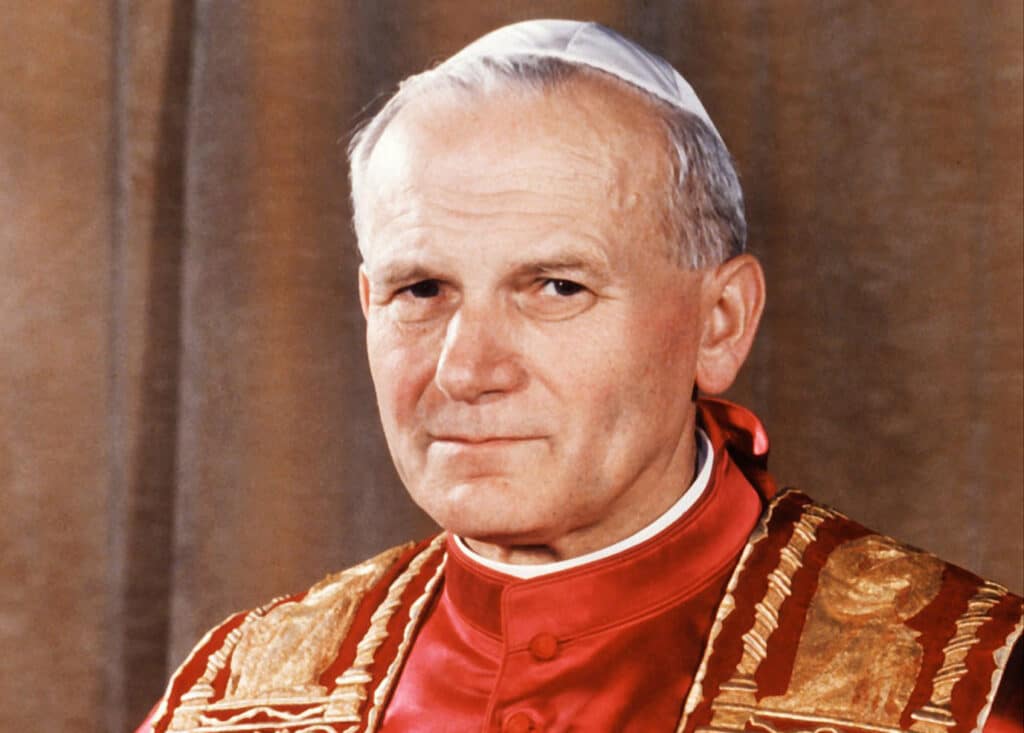When I first sat with the words of Genesis 3:16–17, I felt their weight:
“I will greatly multiply your pains in childbearing; in pain you shall bring forth children, yet your desire shall be for your husband, and he shall rule over you.” (Gen 3:16)
“Because you have listened to the voice of your wife, and have eaten of the tree… cursed is the ground because of you; in toil you shall eat of it all the days of your life.” (Gen 3:17)
At first glance, these words can seem harsh, almost like punishments handed down. But when I turned to John Paul II’s Theology of the Body, I discovered that he read these verses not as God’s arbitrary punishments, but as a revelation of what sin does to the human heart and human relationships.
Broken Communion
 |
| Pope St. John Paul II |
John Paul II explained that before the fall, Adam and Eve lived in perfect harmony — a unity without shame, where each received the other as a gift. But after sin, this unity shattered. The woman’s “desire” for her husband was no longer the pure, reciprocal gift of self. It became marked by concupiscence — the tendency to grasp, to possess, to use.
As JP2 put it:
“Concupiscence brings with it a loss of the interior freedom of the gift. The man becomes the master of the woman… and she will desire this mastership.” (TOB 31:3, October 8, 1980)
In those few words of Genesis, I see the birth of domination, inequality, and the misuse of freedom. The spousal meaning of the body, which was meant for self-giving love, became clouded and distorted.
Toil and Strain with Creation
Genesis 3:17 speaks directly to the man’s work. Once, tending the garden was a joyful participation in God’s creative plan. But after the fall, that same earth resisted. What was meant to be a gift now brought forth thorns, sweat, and toil.
JP2 reflected on this rupture:
“Together with the loss of the original certainty of the image of God, man also lost the certainty of the harmony of his own existence. Work became toil, and birth pains accompanied procreation.” (TOB 27:2, September 24, 1980)
Here I see how sin not only wounded our relationships with each other, but also our relationship with the world we were meant to care for.
Threefold Rupture
Reading TOB, I realized that these verses point to what JP2 often described as the threefold rupture of sin:
- A rupture with God (loss of grace).
- A rupture with each other (desire vs. domination).
- A rupture with creation (toil and suffering).
As JP2 explained, sin’s inheritance is clear:
“This heritage is concupiscence… it consists in the loss of the interior freedom of the gift.” (TOB 32:3, October 15, 1980)
When I look around today, I can still see those ruptures playing out — in broken relationships, in struggles for power, and in our conflict with the environment.
Not the Final Word
But here’s the hope that JP2 never let go of: these verses aren’t the final chapter. They reveal what sin has done, but they also point us toward the need for redemption.
Christ enters into this brokenness and restores what was lost. Where domination once reigned, He shows us love as service. Where toil crushed man’s spirit, He gives meaning to work as participation in the Father’s plan. Where desire became distorted, He purifies eros into a self-giving love that reflects His union with the Church (Ephesians 5).
JP2 reminded us:
“Christ calls man and woman to find again the freedom of the gift, lost with the inheritance of concupiscence.” (TOB 46:6, December 31, 1980)
In other words, the story of Genesis 3 is not simply about loss — it is about the promise of restoration.
Whenever I read Genesis 3:16–17 now, I don’t just hear the echo of judgment. I hear an invitation to recognize the wounds of sin, yes, but also to trust in the Redeemer who heals.
A Short Prayer
Lord Jesus,
You entered into our brokenness and restored what sin had wounded. Heal in me the divisions that still remain — between me and You, between me and others, and between me and creation. Teach me to love as You love, to serve instead of dominate, and to receive others as a gift. May Your redemption transform my heart so that I may live in the freedom of Your original plan.
Amen.
No comments:
Post a Comment